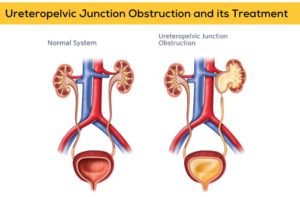
Ureteropelvic junction obstruction (UPJO) is a condition that can affect kidney function. It is important to understand this condition, what causes it, how to recognize the symptoms, and what treatment options are available. This guide will walk you through everything you need to know about UPJO and the importance of expert care, especially in children.
What is Ureteropelvic Junction Obstruction (UPJO)?
The ureteropelvic junction (UPJ) is the connection between the kidney and the ureter, the tube that carries urine from the kidney to the bladder. Ureteropelvic junction obstruction (UPJO) occurs when there is a blockage at this junction that prevents urine from flowing freely. This blockage can cause urine to build up in the kidney, which can lead to swelling (hydronephrosis) and possibly damage kidney function over time.
Causes of Ureteropelvic Junction Obstruction
There are several reasons why UPJ obstruction can occur:
Congenital structural abnormalities: Most cases of UPJ obstruction are present at birth. This is often due to abnormal blood vessels crossing the ureter or narrowing of the ureter itself.
Acquired Causes: In adults, UPJ obstruction can sometimes occur due to kidney stones, scar tissue from previous surgeries, or inflammation.
Risk Factors: Genetic predispositions may increase the chances of developing this condition. It is often seen in children with other congenital anomalies.
Common risk factors include
1. Congenital (present at birth) conditions
2. Anatomical abnormalities
3. Urinary tract problems such as recurrent infections
Knowing these risk factors can help you understand if you or your child may be at risk for UPJO.
Symptoms and Signs of UPJO
Symptoms of ureteropelvic junction obstruction can vary with age.In infants, UPJO is often detected during routine prenatal ultrasounds, but it can also be noticed when the baby has a swollen abdomen. In older children and adults, the most common signs include
1. Abdominal pain (especially on one side)
2. Blood in the urine (hematuria)
3. frequent urinary tract infections
4. Nausea and vomiting
If left untreated, the buildup of urine can damage the kidney, so it’s important to seek medical attention if any of these symptoms occur.
Diagnosing Ureteropelvic Junction Obstruction
To diagnose UPJO, a doctor may use several tests:
Ultrasound: This is often the first test to look for hydronephrosis (swelling of the kidney).
Nuclear renal scan: This test measures how well the kidneys are working and how urine is flowing.
CT scan: A more detailed image that helps identify the blockage.
For children, it’s important to have an experienced pediatric urologist involved in the diagnosis to ensure the best care.
Treatment options for ureteropelvic junction obstruction
Treatment for UPJO depends on the severity of the condition. In mild cases, doctors may monitor the condition to see if it improves on its own, especially in infants.
However, if treatment is needed, surgery is often the best option.
The most common procedure is pyeloplasty, in which the blocked segment of the ureter is removed and reconnected to the kidney so that urine can flow normally. There are several types of pyeloplasty:
1. Open pyeloplasty: Traditional surgery using a larger incision.
2. Laparoscopic pyeloplasty: Minimally invasive surgery using small incisions and a camera.
3. Robotic Pyeloplasty: A more advanced minimally invasive option that uses robotic assistance for precision.
Recovery times vary, but most children and adults recover well and experience significant improvement in kidney function after surgery.
Importance of a pediatric urologist in UPJO treatment
When it comes to treating UPJO in children, specialized care is essential. Pediatric urologists are experts in diagnosing and treating conditions like UPJO in pediatric patients.
Early intervention by a skilled pediatric urologist can prevent long-term kidney damage and ensure a smooth recovery.
Meet Dr. Apoorva Kulkarni: a Leading Pediatric Urologist in Thane, Bandra, and Chembur
If you are looking for expert care for your child’s urological needs, Dr. Apoorva Kulkarni is a highly respected pediatric urologist in Thane, Bandra, and Chembur. Dr. Kulkarni specializes in the diagnosis and treatment of ureteropelvic junction obstruction and other pediatric urological conditions.
With years of experience, he provides compassionate care with a focus on the child’s well-being.
Ureteropelvic junction obstruction is a serious condition that requires timely diagnosis and appropriate treatment. Whether you are concerned about your child or yourself, it is important to understand the symptoms and treatment options. For those seeking expert care, Dr. Apoorva Kulkarni offers specialized pediatric urologist treatment in Thane, Bandra, and Chembur.
If you or your child is experiencing symptoms related to UPJO, don’t delay in scheduling a consultation with Dr. Apoorva Kulkarni. Early intervention can make all the difference in maintaining healthy kidney function.
